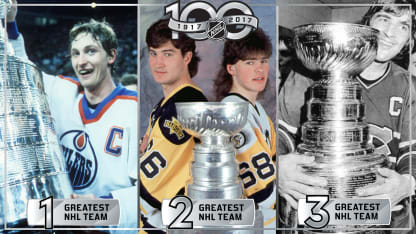The run-and-gun Edmonton Oilers cruised past the competition to win a second consecutive championship in 1985, going 15-3 in the Stanley Cup Playoffs, including a five-game win against the Philadelphia Flyers in the Final. Wayne Gretzky set NHL records for assists (30) and points (47) in a single postseason, and he scored seven goals in the Final to tie the modern record shared by Jean Beliveau of the Montreal Canadiens (1956) and Mike Bossy of the New York Islanders (1982).
IN-DEPTH: [1984-85 Edmonton Oilers voted No. 1 Greatest NHL Team]
Jari Kurri scored 19 goals in 18 games to tie the NHL record for goals in a single postseason. He had four hat tricks, including a four-goal game, to break teammate Mark Messier's record for most hat tricks in one playoff year; Messier had three in 1982-83. Paul Coffey had 12 goals, 25 assists and 37 points to shatter the NHL records for goals, assists and points by a defenseman in one postseason. Bobby Orr of the Boston Bruins held the records for goals (nine, 1970) and assists (19, 1972), and Denis Potvin of the New York Islanders held the record for points (25, 1981).

